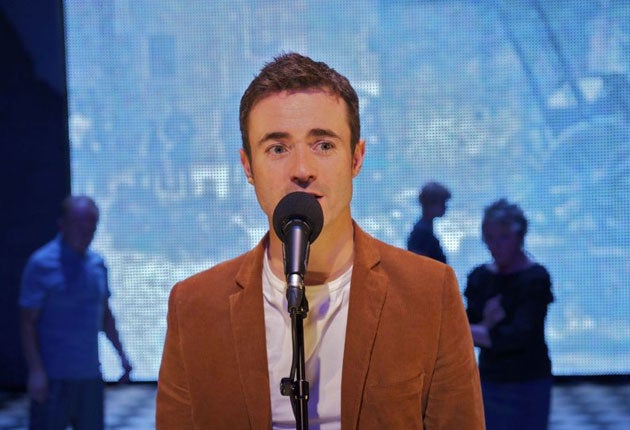The Missing, Tramway, Glasgow

April Fool's Day 1994, the first day of "the cruellest month". A young Scots writer wanders the streets of Gloucester hunting for echoes of the horror which shook the nation when the crimes of Fred and Rose West were uncovered. Instead, he finds friendly neighbours who wish to put their proximity to evil from their mind and a blank-eyed police inspector who ruefully notes that the Wests' victims, in his belief, had one nebulous factor in common: "killability".
So begins a forensic meditation which concentrates not upon the grisly reality of the murders themselves, and not even upon the legacies of the murdered – although the interviews that playwright Andrew O'Hagan conducted for his 1995 debut book are the basis of this new play – but on the very fact of death as an absence. When we go, what is left in our place? Fading memories, unanswered questions, or just the bitter taste of the manner in which we left this life?
Joe McFadden is endearingly nosy as the O'Hagan character, flitting in and out of his own internal monologue and encounters with bereft relatives. The other actors, a five-strong ensemble of some of Scottish theatre's finest, ghost in and out, putting on a new pair of shoes and grimly pushing their chair onstage, the rest of their characters' lives reduced to a slow-motion funeral procession. Against it all, the writer's notes are scratched out on the moving video backdrop, impermanent as the lives of those they're trailing.
He speaks to the police officer whose job is identifying missing persons – "mispers", pronounced as in "whispers" – dragged dead from the Thames, including a woman found with only a pair of red baby's shoes in her pocket. The story becomes ever more O'Hagan's, as he returns to the Glasgow of Fred West's younger days, to the Gallowgate of Bible John victim Helen Puttock.
Finally, we come to Irvine, the Ayrshire new town where the promise of a better life was sealed for O'Hagan's family with red ribbon on brand new bath taps and despoiled by the disappearance of a friend in his youth. This intensely personal perspective reminds us that we each respond to and make sense of tragedy as individuals, for the world is full of disappearing things and mortality is as dependent on remembering the missing as actually finding them.
To 1 October (0845 330 3501)
Join our commenting forum
Join thought-provoking conversations, follow other Independent readers and see their replies
Comments
Bookmark popover
Removed from bookmarks